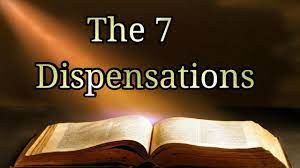Ai – Week 5: The Dispensation of Conscience Genesis 3:6 to 8:14
Week 5: The Dispensation of Conscience
Genesis 3:6 to 8:14
The second dispensation also has two names. It is called the Dispensation of Conscience or the Dispensation of Self-Determination. The first name emphasizes the principle by which the LORD dispensed His economy, the conscience. Conscience was the way God governed mankind. The name for this dispensation comes from Romans 2:15 which states that for a period of time, Elohim dealt with men on the basis of their conscience until finally their conscience became so defiled and seared that it was no longer possible for ADONAI to continue to govern in that way. The second name emphasizes the other side of the coin of conscience, in that man was given the freedom to follow the dictates of his conscience. If he followed his conscience, his self-determination would have led to holiness; but if he did not follow his conscience, or if his conscience was defiled, darkened, or seared, then his self-determination would lead to his ruin.
There are seven dispensations described in the Bible: (1) the Dispensation of Innocence or Freedom (Genesis 1:28 to 3:5); (2) the Dispensation of Conscience or Self-Determination (Genesis 3:6 to 8:14), (3) the Dispensation of Civil Government (Genesis 8:15 to 11:32), (4) the Dispensation of Promise or Patriarchal Rule (Genesis 12:1 to Exodus 18:27), (5) the Dispensation of the Torah (Exodus 19:1 to Acts 1:26), (6) the Dispensation of Grace (Acts 2:1 to Revelation 19:21), and (7) the Dispensation of the messianic or millennial Kingdom (Isaiah 4:2-6, 11:1 to 12:6, 54:11-17, 60:1-22).
The chief person in this dispensation, as in the previous one, was Adam. He received new revelation from God in 3:17-19 that helped to explain the principles and requirements of this new dispensation.
The responsibility was for him to simply follow his conscience. If one listens to his conscience, it will convict him of sin and lead him to salvation. But if he doesn’t listen to it and hardens it, all he has to look forward to is judgment.
The test during that dispensation was first, obedience in the knowledge of good and evil, but secondly, where there was failure, they were to offer a proper and acceptable blood sacrifice. This can be learned from 3:21 and 4:4.
As with the previous dispensation, there will be a failure. This was seen as early as the case of Cain in 4:3-5, who failed to bring a proper blood sacrifice and thought he could come to God on his own terms. In 4:8, failure was seen in the first act of murder when Cain murdered his brother Abel. Failure was also seen in 6:1-5, which speaks of open violence, corruption and widespread sin. The heart of man sought evil continually. Therefore, since the people from Adam to Noah ignored their conscience and followed wickedness, God was forced to bring judgment in the form of a worldwide Flood.
As with the previous dispensation, this one, also, contained the issue of judgment. The judgment in this case was the worldwide Flood (6:7 and 7:23). This brought humanity to an end with the exception of one family. They had become so evil that they could no longer follow their consciences. The conscience of man had become so dark and degenerate, that it was no longer a reliable guide.
As with every dispensation, this one had an element of grace. It was displayed during the Dispensation of Conscience in that God commanded Noah to build an ark (6:14). As a result, Noah and his family were saved and found grace in the eyes of the LORD.






